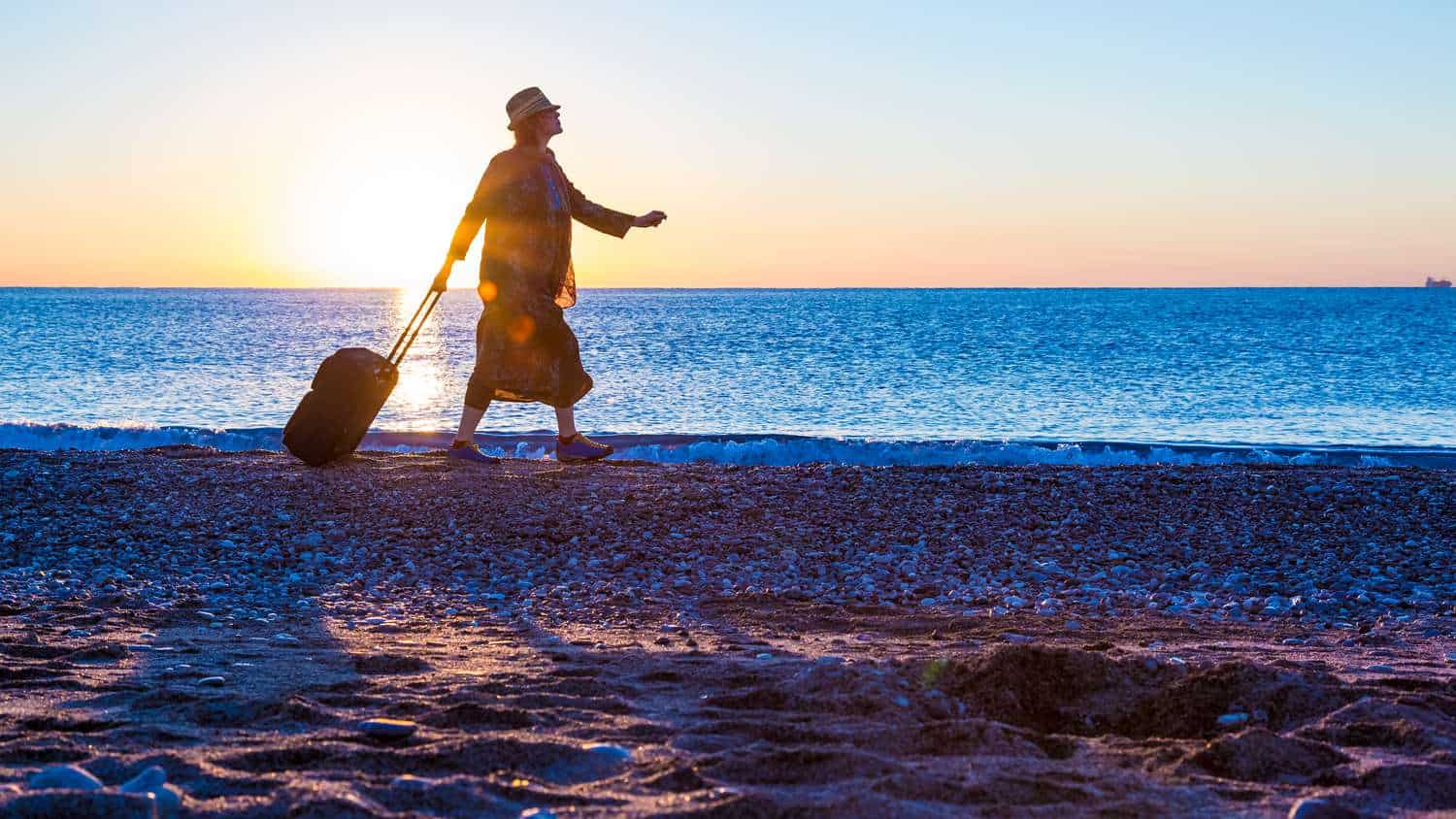Senior Vacations: Embarking on a well-deserved break later in life doesn’t mean sacrificing adventure or relaxation. This comprehensive guide explores diverse vacation options tailored to the needs and preferences of seniors, covering everything from choosing the ideal destination and crafting a budget to ensuring health and safety throughout the journey. We’ll delve into various activity levels, accommodation choices, and transportation options, ensuring your golden years are filled with unforgettable experiences.
From active explorations to tranquil retreats, we’ll navigate the nuances of planning a senior vacation, helping you create a memorable and fulfilling experience. We’ll consider accessibility, budget considerations, and health concerns to ensure your trip is both enjoyable and safe. Whether you dream of a relaxing beach getaway or an exciting cultural adventure, this guide provides the tools and information you need to plan the perfect trip.
Budgeting and Planning a Senior Vacation
Planning a senior vacation requires careful consideration of various factors, particularly budgeting. A well-structured budget ensures a relaxing and enjoyable trip without the stress of unexpected financial burdens. This section outlines a step-by-step approach to creating a realistic budget and addresses essential pre-trip preparations.
Creating a Realistic Vacation Budget
Budgeting for a senior vacation involves a systematic approach encompassing all anticipated expenses. Begin by determining the total amount you are willing to spend. Then, break this total down into key categories: travel, accommodation, activities, and miscellaneous expenses. For travel, consider airfare or train tickets, ground transportation (taxis, buses, rental cars), and potential parking fees. Accommodation costs depend on your chosen lodging (hotel, resort, rental property), factoring in nightly rates and any additional fees. Allocate funds for planned activities such as tours, museum visits, or shows. Finally, set aside a contingency fund for unforeseen expenses – a medical emergency, for instance, or a flight delay requiring additional accommodation. Using a spreadsheet or budgeting app can significantly aid in this process. For example, a two-week trip might allocate $2000 for flights, $3000 for accommodation, $1000 for activities, and $500 for miscellaneous expenses, totaling $6500. This is just an example; your budget will vary based on your destination and travel style.
Travel Insurance for Senior Travelers
Travel insurance is crucial for senior travelers, offering protection against various unforeseen circumstances. Policies typically cover medical emergencies, trip cancellations, lost luggage, and other potential issues. Several options exist, ranging from basic coverage to comprehensive plans. Basic plans might cover only medical emergencies, while comprehensive plans include broader protection. Consider factors such as pre-existing conditions when selecting a policy. Many insurers offer specific plans tailored to senior travelers, addressing their increased risk profile. It’s recommended to compare quotes from different insurers before making a decision. For instance, a comprehensive plan might cost around $200-$300 for a two-week trip, offering peace of mind and financial security in case of unexpected events. This cost is a small price to pay for the protection offered.
Essential Documents and Preparations
Before embarking on a senior vacation, thorough preparation is essential. Gather all necessary travel documents, including passports, visas (if required), flight/train tickets, and hotel confirmations. Make copies of these documents and store them separately from the originals. Inform your bank and credit card companies of your travel dates to avoid any issues with transactions. Ensure your medications are adequately stocked, with copies of prescriptions readily available. Consider packing a small first-aid kit containing essential supplies. Additionally, create a detailed itinerary, sharing it with a trusted contact at home. Preparing a contact list including emergency numbers and relevant addresses is also highly recommended. Finally, research your destination’s customs and local laws to ensure a smooth and trouble-free vacation.
Senior Vacation Activities and Entertainment
Planning engaging activities is crucial for a fulfilling senior vacation. The goal is to cater to diverse interests and mobility levels, ensuring everyone enjoys their trip to the fullest. Consider offering a range of options to suit different preferences and physical capabilities.
Choosing the right activities can significantly impact the overall enjoyment of a senior vacation. Factors such as physical limitations, personal interests, and desired pace of travel should all be taken into account when designing an itinerary. A well-balanced schedule ensures that everyone feels comfortable and engaged throughout the trip.
Variety of Engaging Activities for Seniors
A successful senior vacation itinerary offers a diverse range of activities. This caters to varying interests and physical capabilities, ensuring everyone feels included and entertained.
- Relaxation and Wellness: Spa treatments, gentle yoga classes, leisurely walks in scenic parks, or quiet time for reading and reflection.
- Cultural Experiences: Visiting museums with accessible entrances and seating, attending local performances (concerts, plays), or taking a guided tour of historical sites with appropriate pacing.
- Active Pursuits (Adaptive Options Available): Gentle cycling tours on paved paths, guided nature walks with rest stops, adapted water activities like kayaking or boat tours with accessible ramps, or even adapted golfing.
- Social Interaction: Joining group tours or activities to meet fellow travelers, participating in community events or workshops, or simply enjoying meals together in a relaxed atmosphere.
- Educational Opportunities: Attending lectures, cooking classes, or workshops tailored to senior interests, exploring local markets or historical sites with guided tours, or participating in storytelling sessions.
Finding and Booking Senior-Specific Tours and Excursions
Many tour operators specialize in catering to the needs of senior travelers. These companies often offer customized itineraries, accessible transportation, and experienced guides who understand the specific needs of older adults.
Websites dedicated to senior travel, travel agencies specializing in senior vacations, and online travel platforms often filter search results to show senior-friendly options. Look for tours that advertise features such as slower paces, comfortable transportation, convenient accommodations, and readily available assistance.
When booking, explicitly state any mobility limitations or special needs to ensure the tour operator can provide suitable arrangements. Read reviews from other senior travelers to gauge the experience and accessibility of the tour.
Examples of Accessible Cultural Experiences and Historical Sites
Many cultural attractions and historical sites offer accessibility features for senior visitors. These features can significantly enhance the enjoyment and comfort of the experience.
- Museums with Accessible Entrances and Elevators: Many major museums provide ramps, elevators, and wheelchair-accessible restrooms. Check the museum’s website in advance to confirm accessibility features and inquire about any assistance programs they might offer.
- Historical Sites with Well-Maintained Paths and Rest Areas: National parks and historical sites often have paved pathways, benches, and rest areas strategically placed along the route. Some offer guided tours with adjustable pacing and rest stops.
- Gardens and Botanical Gardens with Accessible Trails: Many botanical gardens offer accessible pathways, allowing visitors to enjoy the beauty of nature without strenuous exertion. Wheelchair rentals may also be available.
- Theaters and Concert Halls with Accessible Seating: Many performing arts venues offer wheelchair-accessible seating and assistive listening devices. Check the venue’s website or contact the box office to confirm accessibility features.
Accommodations for Senior Travelers
Choosing the right accommodation is crucial for a successful senior vacation. The comfort and accessibility of your lodging significantly impact the overall enjoyment and safety of your trip. This section explores various options and highlights features to consider when selecting senior-friendly accommodations.
Types of Senior-Friendly Accommodations
Senior travelers have a range of accommodation options to choose from, each with its own advantages and disadvantages. Hotels, resorts, and assisted living facilities offering vacation packages all cater to different needs and preferences. Hotels generally offer a wide range of amenities and locations, but may lack specialized support services. Resorts often provide more inclusive packages with activities and entertainment, but can be more expensive. Assisted living facilities offering vacation packages provide a higher level of support and care, making them ideal for seniors requiring assistance with daily living activities. The choice depends largely on the individual’s level of independence and desired level of support.
Features of Senior-Friendly Accommodations
Several key features contribute to making accommodations suitable for senior travelers. Accessible rooms are essential, featuring features such as roll-in showers, grab bars, wider doorways, and adjustable height beds. Amenities should include comfortable seating, well-lit areas, and easy-to-navigate layouts. Support services can range from readily available medical assistance to transportation services and on-site dining options. The presence of emergency call systems within the rooms provides an additional layer of security. Consideration should also be given to the proximity of amenities such as restaurants, shops, and medical facilities.
Examples of Descriptions for Senior-Friendly Accommodations
Consider these examples showcasing how accommodations can highlight their senior-friendly features:
Example 1 (Hotel): “Our hotel offers a range of accessible rooms with roll-in showers, grab bars, and spacious layouts. We are conveniently located near local attractions and provide complimentary shuttle service to nearby medical facilities. Our concierge is happy to assist with any needs, ensuring a comfortable and stress-free stay.”
Example 2 (Resort): “Enjoy a relaxing vacation at our resort, designed with seniors in mind. Our accessible villas feature private patios, comfortable furnishings, and easy access to our on-site spa and dining options. Our dedicated team provides assistance with transportation and activities, ensuring a truly unforgettable experience.”
Example 3 (Assisted Living Facility with Vacation Packages): “Our assisted living community offers unique vacation packages designed for seniors who appreciate a supportive and engaging environment. We provide personalized care, delicious meals, and a vibrant social program. Our comfortable and accessible suites feature emergency call systems and 24-hour support.”
Ending Remarks
Planning a senior vacation requires careful consideration of various factors, but the rewards are immeasurable. By thoughtfully addressing aspects like destination choice, budget management, health precautions, and transportation logistics, seniors can confidently embark on enriching travel experiences. This guide aims to equip you with the knowledge and resources to create a fulfilling and memorable journey, allowing you to savor the fruits of your labor and enjoy the best that travel has to offer during this exciting chapter of life. Remember to prioritize your well-being and tailor your itinerary to your personal preferences for a truly rewarding experience.




